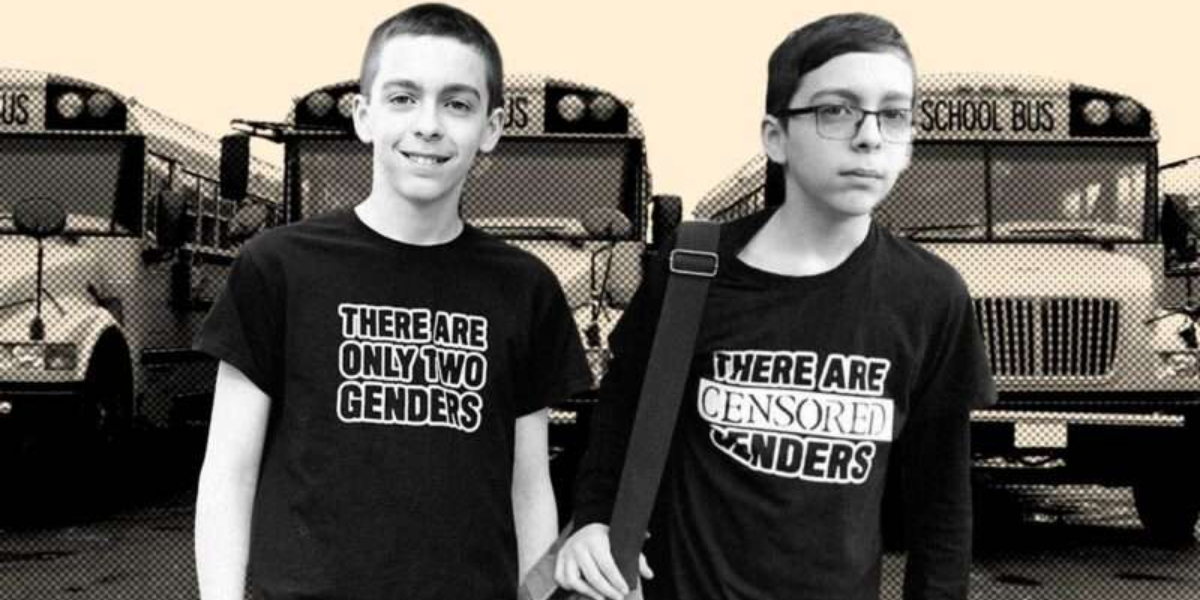The U.S. Supreme Court has turned down the case of a middle school girl in Massachusetts who was told she couldn’t wear a T-shirt that said “There are only two genders.” This decision has been praised and criticized. The decision upholds a federal appeals court’s decision that the school had the right to limit the student’s speech because they were worried about how it might hurt transgender and gender-nonconforming students.
The case is about a student at Middleborough, Massachusetts’s John T. Nichols Middle School who was told he couldn’t wear the T-shirt because it seemed to say something that goes against how society is becoming more accepting of gender differences. The “only two genders” T-shirt was deemed disruptive by the school’s administrators, who said it could make the setting hostile for students who don’t fit the standard binary view of gender.
The student also wore a shirt that had been changed. The words “two genders” were covered with tape that said “censored.” Even with this change, school officials still wouldn’t let the student wear the shirt, which started the lawsuit that ended up in the Supreme Court.
Justices Samuel Alito and Clarence Thomas were the only ones on the court who didn’t agree with the decision. They said the case should have been heard. There was a chance for the court to answer an important question for the country’s youth, but they didn’t. Alito said, “Whether public schools may suppress student speech either because it expresses a viewpoint that the school disfavors or because of vague concerns about the likely effect of the speech on the school atmosphere or on students who find the speech offensive.”
The case is getting more attention across the country, in part because of the heated arguments about free speech, identity, and acceptance in schools across the country. Alito’s objection pointed out that the school district had blocked a different point of view while allowing other types of student speech, namely those that supported the idea that there are multiple genders. He said that this kind of selective filtering goes against the idea of free speech and could set a bad example for other cases where students are trying to express themselves.
The majority of the Supreme Court, on the other hand, agreed with the First U.S. Circuit Court of Appeals that the T-shirt should be banned by the school system. The appeals court said that the message on the T-shirt could “poison the educational atmosphere” and make it hard to learn. The court also talked about Tinker v. Des Moines Independent Community School District, a famous case from 1969 that said students had the right to speak out in school as long as it didn’t get in the way of learning in a “substantial” way. In this case, the appeals court decided that the shirt could really cause that kind of trouble.
The Middleborough school district’s decision is in line with the Tinker case, which says that schools can limit student speech if it is thought to be getting in the way of the school’s work or other people’s rights. So, the school district said that the message on the T-shirt might be bad for transgender students and other students who don’t fit standard gender roles.
The student, whose name has not been made public, and those who support him say that this choice goes against their right to free speech under the First Amendment. They say that the school’s decision to ban the T-shirt was too far and that students should be able to say what they think, even if it makes some people uncomfortable or causes controversy.
The decision has caused a split in public opinion. People who agree with the school’s choice say it’s important to make sure all students are safe and welcome, especially those from underrepresented groups. On the other hand, people who support free speech say that this is a clear case of silencing because the student’s speech wasn’t meant to cause violence or trouble; it was just a controversial view on gender that they wanted to share.
People will probably keep talking about this case when they talk about free speech, the role of schools in shaping social problems, and students’ rights to say what they believe. The Supreme Court’s decision not to hear the case means that the ruling will stand, but it’s clear that these problems are still not over.
For now, the Middleborough school district’s choice serves as a reminder of how schools must protect students’ rights while also making sure everyone feels safe and respected.
“This article was written by Mathew Owen. AI tools were used lightly for grammar and formatting, but the ideas, words, and edits are all mine.”


 by
by 

